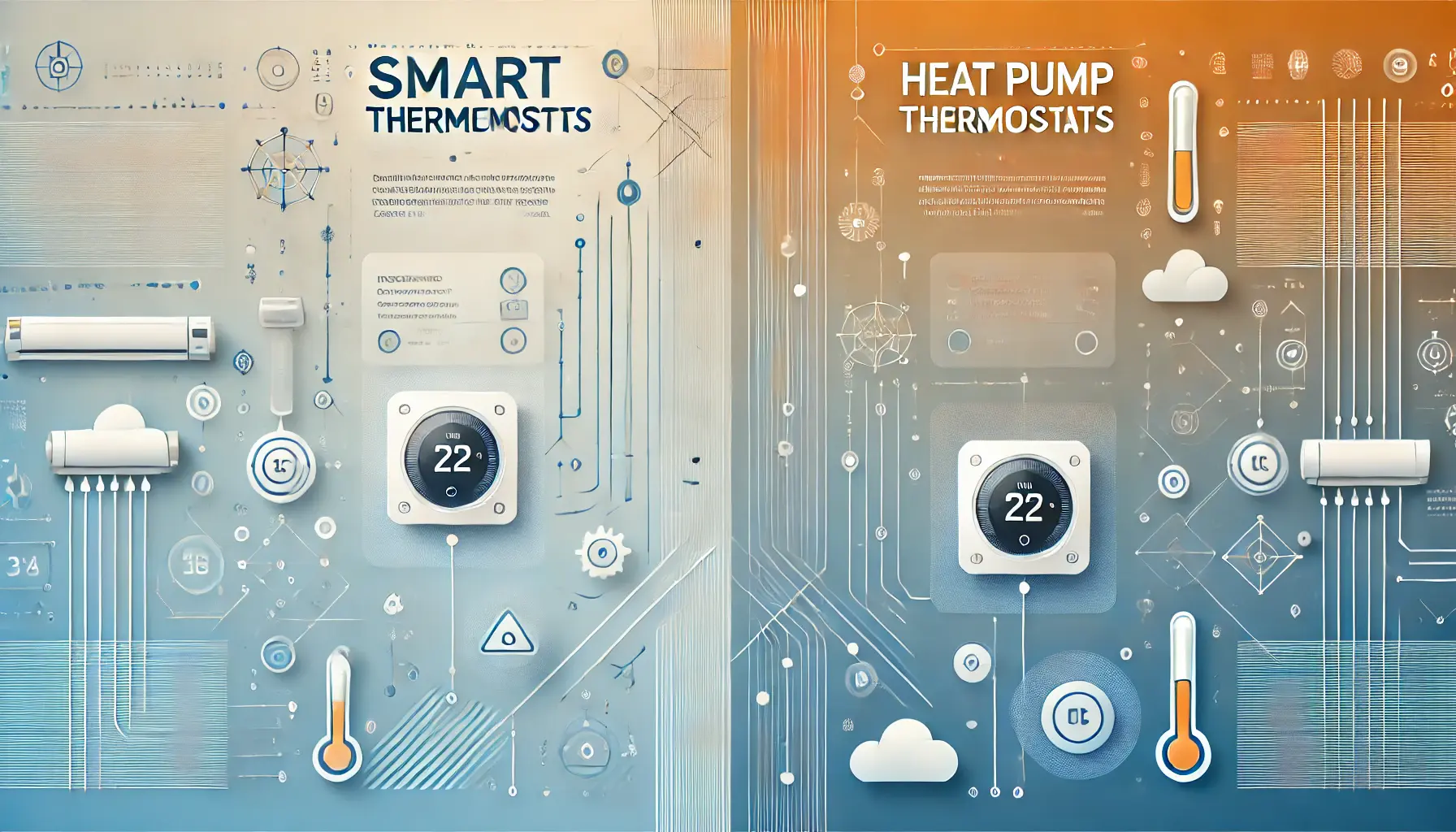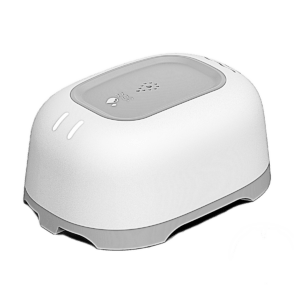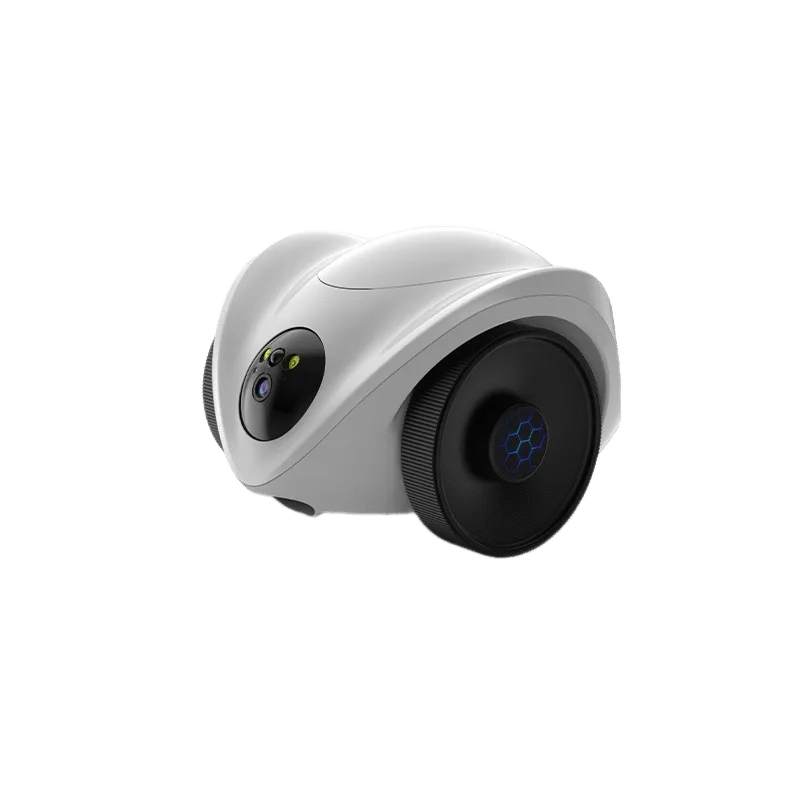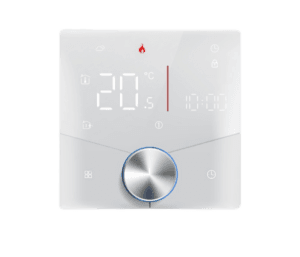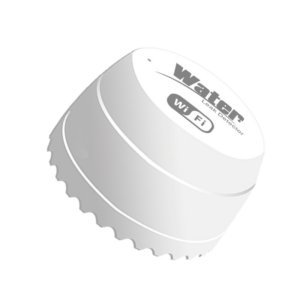Smart thermostats and heat pump thermostats are critical tools in modern home temperature regulation. While they share some similarities, their functionality and use cases differ significantly. In this article, we’ll explore how these devices differ, their key features, and how they complement each other in creating an efficient and comfortable home environment.
What is a Smart Thermostat?
A smart thermostat is an advanced home thermostat designed to automate and optimize home temperature settings using modern technology. Smart thermostats connect to Wi-Fi, allowing homeowners to control them remotely via a smartphone app or voice assistant.
Key Features of Smart Thermostats
- Wi-Fi Connectivity
- Devices like the Nest Thermostat or Honeywell Thermostat offer app-based control over home heating and cooling.
- Wireless Smart Thermostats eliminate the need for physical access to the unit.
- Energy Efficiency
- Smart thermostats analyze usage patterns to recommend optimal settings, saving energy and reducing utility bills.
- Remote Sensors
- Models like the Sensi Thermostat and Thermostats with Remote Sensors ensure accurate temperature adjustments for specific rooms.
- Smart Home Integration
- Compatible with systems like Amazon Alexa, Google Assistant, and Apple HomeKit, making them integral to smart home thermostat setups.
What is a Heat Pump Thermostat?
A heat pump thermostat is specifically designed to control heat pumps, which are systems that provide both heating and cooling by transferring heat rather than generating it. Unlike regular thermostats, these are optimized for the unique operational needs of heat pumps.
Key Features of Heat Pump Thermostats
- Heating and Cooling Support
- Heat pump thermostats work seamlessly with systems that need to switch between heating and cooling modes automatically.
- Emergency Heat Mode
- These thermostats include backup settings to engage auxiliary heating during extreme cold conditions, ensuring consistent comfort.
- Optimized for Efficiency
- The best smart thermostat for heat pumps, such as the Nest Thermostat, minimizes energy consumption while maximizing comfort.
Smart Thermostats vs. Heat Pump Thermostats
| Feature | Smart Thermostat | Heat Pump Thermostat |
|---|---|---|
| Purpose | General home heating and cooling | Specific to heat pump systems |
| Energy Efficiency | Optimized for overall energy savings | Specialized for heat pump efficiency |
| Connectivity | Includes Wi-Fi and smart home integration | May or may not include smart features |
| Backup Heating | Not specifically designed for auxiliary heat | Supports emergency heating modes for heat pumps |
| Remote Sensors | Available in advanced models (e.g., thermostat with sensors) | Rarely includes remote sensors |
| Best Models | Nest, Honeywell, Sensi | Nest, Ecobee, Carrier |
How Smart Thermostats and Heat Pump Thermostats Complement Each Other
1. Integrated Control
Many smart thermostats, such as the Nest Thermostat or Honeywell Wi-Fi Thermostat, are compatible with heat pump systems. This means homeowners can enjoy the smart features of remote control, scheduling, and energy tracking while leveraging the efficient operation of heat pumps.
2. Enhanced Comfort
Smart thermostats with remote sensors ensure that temperatures are consistent throughout the home, complementing heat pumps by addressing uneven heating or cooling.
3. Energy Optimization
When paired with a heat pump, smart thermostats can analyze energy use patterns to fine-tune operation schedules, maximizing efficiency and minimizing utility costs.
Other Types of Thermostats and Their Roles
Thermostatic Radiator Valves
- Designed for water-based heating systems, these valves control the flow of hot water to radiators, ensuring room-specific temperature adjustments.
- Ideal for homes with radiators but not typically compatible with heat pumps.
Electric Baseboard Heater Thermostats
- These thermostats are specialized for electric baseboard heaters, providing precise control of electric heating systems.
- While efficient for individual rooms, they don’t integrate with central systems like heat pumps.
Furnace Thermostats
- Common in homes with gas or oil furnaces, these thermostats control traditional heating systems.
- Unlike heat pump thermostats, they don’t support cooling functions.
Water Heater Thermostats
- Built specifically for water heaters, these thermostats regulate water temperature but have no role in air temperature control.
Choosing the Right Thermostat
When deciding on a thermostat, consider the specific needs of your home and heating system:
| System | Recommended Thermostat |
|---|---|
| Heat Pump System | Best smart thermostat for heat pumps (e.g., Nest) |
| Smart Home Setup | Wireless smart thermostat with Wi-Fi (e.g., Sensi) |
| Electric Baseboard Heaters | Electric baseboard heater thermostat |
| Radiator Heating System | Thermostatic radiator valves |
| Furnace System | Furnace thermostat (e.g., Honeywell) |
Top Thermostat Recommendations
1. Nest Thermostat
- Best for: Smart home integration and heat pump compatibility.
- Features: Remote control, energy-saving scheduling, and multi-platform support.
2. Honeywell Wi-Fi Thermostat
- Best for: Budget-friendly smart home thermostats.
- Features: Wi-Fi connectivity and simple app-based control.
3. Sensi Thermostat
- Best for: Easy installation and energy tracking.
- Features: Remote sensors and detailed energy reports.
4. Ecobee Smart Thermostat
- Best for: Advanced features and compatibility with multiple systems.
- Features: Built-in Alexa, remote sensors, and support for heat pumps.
Both smart thermostats and heat pump thermostats play vital roles in modern home temperature management. While a smart thermostat offers connectivity, energy savings, and advanced features, a heat pump thermostat ensures the efficient operation of heat pump systems. Combining the two can create a powerful, integrated solution for a comfortable and energy-efficient home.
Whether you’re looking to upgrade your existing thermostat or invest in a new heat pump system, understanding the differences and connections between these devices will help you make the best choice for your home.
